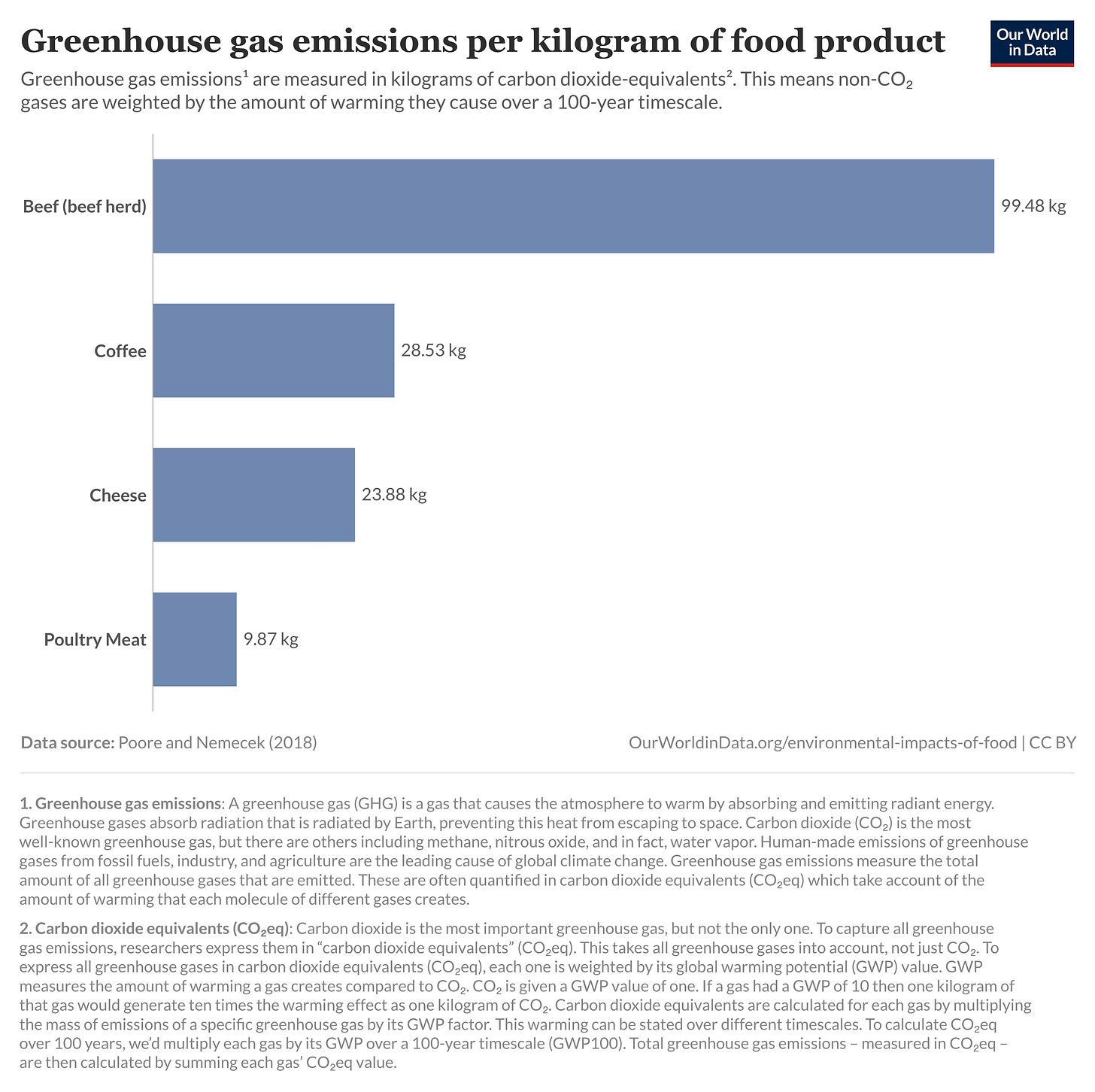Brewing a Better Future: Coffee Without the Beans ☕️
SF had the Future Food-Tech conference last month, and before the main event, some side events were happening around the city.
I went to this one, which had a cool mix of people working on big food system problems: especially tackling environmentally harmful pesticides. But what really caught my attention was coffee without beans, aka molecular coffee.
One employee there gave a quick pitch about her company, Compound Foods, and how they’re making their molecular coffee that supposedly tastes like the real thing. The general idea is to replicate the properties of coffee, like taste, aroma, and mouthfeel, without beans. I was intrigued, so I went to chat with her afterward.
The Environmental Cost of Coffee
She enthusiastically explained that coffee farming is a significant cause of global warming and that current farming practices are unsustainable from an environmental perspective. So, they’re trying to recreate coffee without needing to grow beans at all.
"But greenhouse gas emissions from coffee farming are nowhere near the level of animal farming, right?" I asked. She looked at me still enthusiastically and said, "No, it emits as much greenhouse gas!" I hadn't thought of coffee as one of those environmentally harmful products. So I did some digging back at home to check if coffee farming is that bad for the environment.
Turns out… yeah, it’s worse than I thought.
Coffee emits more greenhouse gases per kilo than chicken or cheese(see below). Much comes from deforestation (especially in tropical regions), energy-intensive processing, and transportation from remote farms to your cup. It’s still not as bad as beef, but it’s not low-impact either.
Deforestation is especially shocking. A 2020 World Wildlife Fund (WWF) report estimates that about 130,000 hectares of forest are cleared each year for coffee production, equivalent to the land area of Tokyo! This massive deforestation fuels climate change, destroys biodiversity, disrupts the water cycle, degrades soil, and displaces animals and indigenous communities that depend on forests for survival.
The first time I read about deforestation, I struggled to grasp the magnitude of its impact. However, after watching the heartbreaking footage below from A Life on Our Planet by the amazing David Attenborough, I truly understood its significance.
You can watch another footage here, which is equally heart-breaking.
The Brewing Economic Crisis
Beyond the environmental concerns, she raised another pressing issue: the economic sustainability of coffee. Why? It requires massive amounts of land, and with global warming bringing higher temperatures and unpredictable weather to coffee-growing regions, the supply is getting shakier. Ironically, they are the cause of global warming and are also affected by it.
They will be affected by global warming because coffee can be grown only in a very narrow band(the coffee belt). That band is really sensitive to temperature because the beans mature too quickly if it's too hot. When a coffee bean matures too quickly, it loses all the aroma and flavor, which means smaller yields.
At the same time, the demand for coffee is experiencing significant growth globally. Global coffee consumption has demonstrated consistent growth over recent years. In the 2021/22 coffee year, consumption increased by 4.2% to 175.6 million 60-kilogram bags. This upward trend continued into 2023, with total global coffee servings rising 5% year-over-year.
If coffee supply drops and demand goes up, prices will shoot up. This isn't just hypothetical.
In 2024, Brazil (by far the largest producer of Arabica coffee, which accounts for approximately 60–70% of global coffee production) was hit with the worst drought in 70 years. Crops failed, yields dropped, and by early 2025, the price of wholesale Arabica hit $4.30 per pound, more than double the year before. The average price of ground roast coffee in the U.S. jumped to $7.25 per pound, an all-time high.
We won't be able to supply the world with coffee unless we find a more efficient way to produce it. This makes molecular coffee seem less like a gimmick and more like necessary progress.
How Do You Make Coffee Without Beans?
At this point, I was sold on the idea of molecular coffee. But how do you recreate coffee without beans? Let's see how Atomo Coffee, the pioneer in this space, did it.
They began by analyzing coffee molecules. Then, they incorporated sustainable, alternative, plant-based ingredients and guided them through the reactions and their patented processes to produce the target coffee.
Their website illustrates how Atomo’s production roughly works.
First, they rescue discarded date seeds from local farmers. These seeds are then cleaned and de-fleshed, removing the fleshy parts from a seed, leaving the edible kernel. Then, they are dried to ensure consistency and reduce moisture.
A further round of cleaning and preparation follows before the materials are sent to Atomo’s Seattle Roastery.
At this stage, Atomo gathers all its core ingredients, which include date seeds, sunflower seed extract, ramon seeds, fructose, pea protein, millet, lemon, guava, defatted fenugreek seeds, caffeine, and baking soda. All these ingredients appear to be plant-derived and safe. The only non-plant ingredient here is baking soda, but it’s generally safe and widely used in baking.
Once at the roastery, Atomo engineers blend these ingredients. The blends then undergo roasting, soaking, compounding, and other proprietary steps.
Finally, the finished product is ground and packaged for different brewing methods, including espresso and drip coffee.
Atomo Coffee’s production process seems sustainable and clean. It uses plant-based(except for safe baking soda), non-GMO ingredients without relying on heavy bioengineering: just smart upcycling and normal processes like roasting and soaking.
The Rise of Coffee Without Beans
Compound Foods and Atomo aren’t alone. Other companies like Northern Wonder, Voyage Foods, and Prefer have entered the scene, all racing to reimagine coffee from the ground up, without the beans.
Like other startups, the challenge is to cross the chasm and dominate the mass market. I'd say it won't be enough to be environmentally friendly and as good as conventional coffee in terms of taste and price. But with added values such as health benefits, lower prices, new coffee types, or sustainable supply to coffee businesses, they may be able to scale, and I hope they do.


